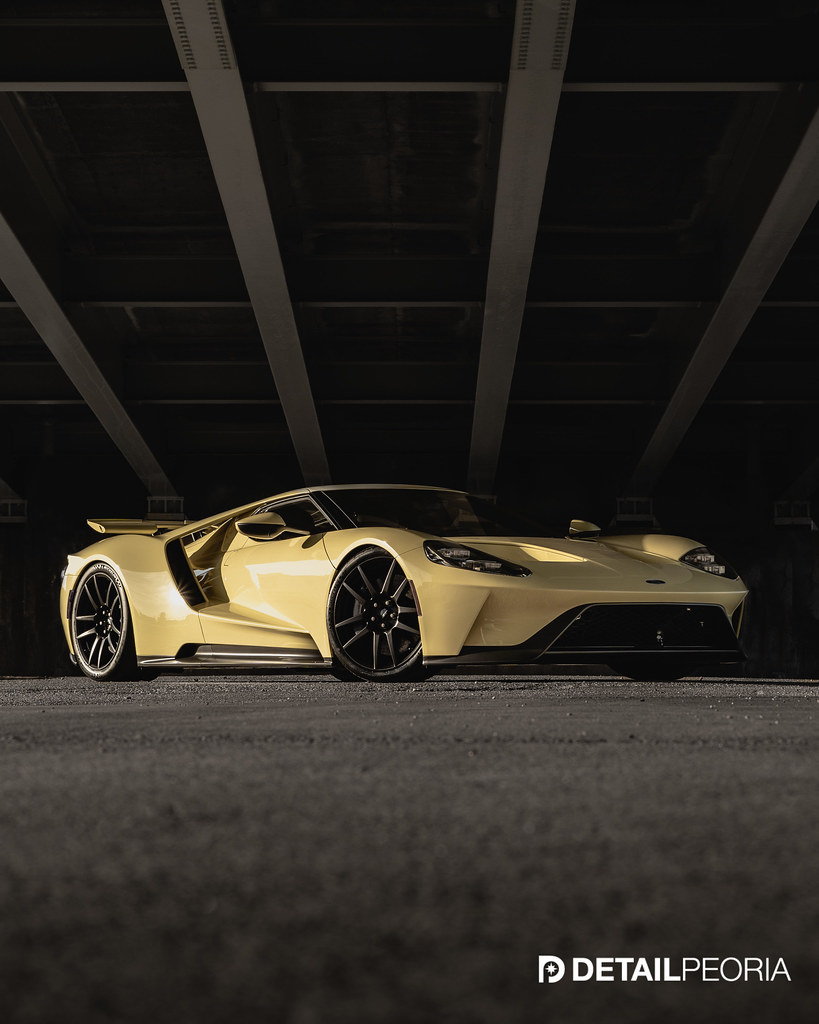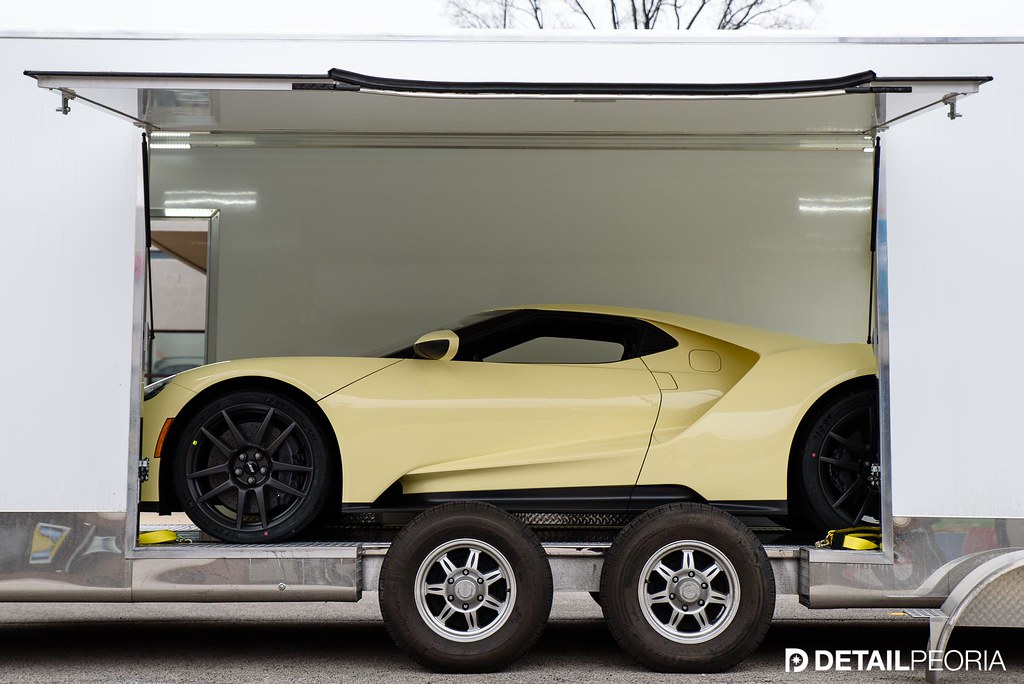
One of 250 cars hand built for 2018, of which only 125 will stay in the US – production number 21 of all cars to be produced. If that was not rare enough, this 2018 Ford GT was custom spec’d far beyond the standard build. Equipped with options such as: paint to sample (the only car made with this Springtime Yellow paint color), satin carbon fiber aerodynamics, satin carbon fiber wheels, titanium lugnuts, titanium exhaust, and Lightspeed interior package this car is like no other you will ever lay eyes upon.
In January we got the call that the owners would have this car delivered and were in need of having it protected so that, hold your breath… yes, that is right… they could drive it! We were thrilled to hear their intent of getting this car on the road and quickly got into action to collaborate with a paint protection installer. We later scheduled an inspection of the vehicle to devise a plan of attack and quickly realized that the paint would need some attention prior to covering the entire vehicle with the protective film.

See, hand built exotic cars such as this are just that. They are hand built. They are assembled with precision and the utmost attention to detail. But, when it comes to the paint work the common areas of concern were there in plain sight. This car like many other exotics had extensive sanding and rotary polishing to remove any small dust nibs that could be in the paint as well as leveling any texture, known as orange peel. The good news is, that once we are able to perform our services we are left with a finish you would typically not find on any car that came off the assembly line
When the car was delivered to Detail Peoria the process began with a complete wash and decontamination to ensure that the surfaces were prepared for paint correction. Even though the car came to us clean we still opted to foam the car for the additional lubrication it provides.
Once washed a chemical decontamination was followed with a fine grade clay and Nanoskin Glide as a lubricant. This gave us a clean slate to begin out polishing.
With a hand-painted vehicle paint thicknesses can vary more from panel to panel than that of a production vehicle. So, we wanted to remove as little clearcoat as possible for the longevity of the paint. We tested multiple panels to see how our combinations worked on three types of defects: rotary buffer trails, sanding marks, and random scratches varying in severity. Starting from a light abrasive, gradually stepping up we settled on a combination that sorted out all three types of defects. Our cutting process to remove the deepest of defects began with Griot’s Fast Correcting Cream a Meguairs microfiber pad and an assortment of Rupes polishers, which we will touch on later. The cutting step safely leveled all defects giving us nearly a flawless surface, leaving only minimal marring. On this Springtime Yellow paint the marring was so light it was nearly undetectable on camera. We were then able to follow up with Meguiars M205 polish on a white Lake Country polishing pad, remedying any of the light marring created by the cutting passes. In our shop we find the exact product and pad combination to be our absolute most versatile.
As mentioned above, we had several types of defect to remedy. Here is an example of random isolated deep scratches (RIDS) that were likely incurred during shipping.
After finding the proper combination they were removed.
The second type of defect we sorted out were several areas that sanding marks were left behind.
Each sanding mark was targeted specifically for correction.
And lastly were rotary buffer trails that left a dull hologramed surface on each of the body panels. Pictured in the right two lights you can see a noticeable cloudiness, compared to the corrected section featured in the left two lights.
Whether you run a shop or are just a weekend warrior tackling your family vehicles it is vital to have a “go-to” to tackle a number of projects. Changing the amount of product, machine speed, or number of passes can give you additional variables to give the cut and finishing polish you desire. Trying every product under the sun can be fun and tempting, but in the end can be costly in time, money, and remaining hair follicles left on your head if the testing goes poorly. In our shop we see a wide range of vehicles, from vintage Ferraris with finicky paint to modern SUVs with paint as standard as it comes. Even with this wide range of paint types we currently stock 4-5 compounds and 6 polishes. That is plenty for a shop providing paint correction for over 100 vehicles per year, because of our reliable go to products. If you are getting more serious about paint correction it would be highly encouraged to build out your go to compounds, polishes, and pads. In the end it makes the results for more predictable than giving a new product a stab on every project.
When it comes to machine polishing, there is something to said for having the right tools for the job and when it comes to the new GT the right tools are a much wider range than the standard vehicle. Countless hours were invested with an array of polishers to refine even the most intricate areas.
This process removed both the remaining sanding marks as well as buffer trails from all the painted surfaces leaving behind the best finished paint we have yet to work on. Using both a Rupes iBrid short neck polisher and Rupes iBrid long neck polisher in conjunction with 1” and 2” pads most of the most intricate flying buttress areas were compounded and polished, spending 15 hours with the iBrids in those areas alone. Without specialty tools like the Rupes iBrid the complex curves and extreme angles would not have looked nearly as good as the flatter areas of the vehicle. For those of you considering paint correction work on your own exotic vehicle, make sure the shop you choose has the proper equipment to produce the best possible results. After we invested just over 60 hours of paint correction the surfaces were at the level you would expect for this iconic car.
Now that the paint had been perfected, it was time to protect. In a collaboration with Chicago Auto Pros we relied of the decades of experience from their installers to have the surfaces wrapped. Using Xpel Ultimate Plus paint protection film on the painted surfaces and Xpel Stealth on satin carbon surfaces to retain to same look from the factory the wrap was methodically thought out. High impact areas like the vents in the wheel wheels behind the pair of front wheels and bottom of the doors were wrapped. Likewise, high traffic areas like the carbon door sills were also protected preserve those areas from passengers getting in and out of the car.
After the paint protection film crew wrapped up (pun intended) it was on to the final step of protection. The wrapped surfaces were coated with a nano-coating to increase hydrophobic properties, increase gloss, and ensure that bonded particles did not accumulate from the sticky Michelin Cup 2 tires flinging road debris. The wheels were then removed for their coatings along with the giant brake calipers. For coating products, we turned to our friends at Gyeon Quartz to provide coatings that would stand the test of time.
With the project behind us we can now say this was a true pleasure for our team. Together with the paint protection film experts at Chicago Auto Pros we were able to perfect and protect this car so that it looks great now and for years to come. Working with gracious and humble owners that enjoy motorsports as much as we do this in an experience we will not soon forget.
